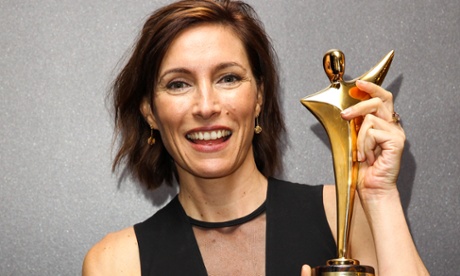
There came a moment during last night’s Aacta awards ceremony where I found myself wondering, “Why are all these awards being handed out during the Baz Luhrmann show?” Said moment came during the musical tribute to the director’s work, which felt redundant since the rest of the night was almost entirely about him anyway.
Luhrmann’s unfairly maligned, tangentially Australian The Great Gatsby took out every award it was nominated for, except best lead actress (sorry, Carey Mulligan) which went to Rose Byrne for a magnetic seven-minute performance in The Turning, a film in which she was nowhere even close to being lead actress.
For Australian film, it was truly a night of oblivious purpose.
It is a somewhat embarrassing reflection of what’s important to our industry to see the significance of money and celebrity placed on the ceremony’s highest pedestal. With each passing award the glimmer of hope that someone without significant international cache would eke out a win against Baz’s glittery leviathan faded.
Seeing the Aacta proudly tweet of Luhrmann’s brief recognition of The Rocket star Sitthiphon Disamoe during an acceptance speech for best lead actor on Leonardo DiCaprio’s behalf, without any trace of self-awareness, was dismaying to say the least. What was worse was watching talents like Kim Mordaunt and Ivan Sen fight over scraps for best original screenplay; Mordaunt emerged victorious for The Rocket.
On the Aacta website, the industry organisation boasts proudly of the awards’ ability to “create new career opportunities for Australia’s best performers and practitioners”. It’s at this point I must wonder: exactly what do these industry members expect The Great Gatsby, Baz Luhrmann, and international movie stars Leonardo DiCaprio, Joel Edgerton and Rose Byrne to gain from winning what is perhaps mockingly referred to as the “Australian Oscar”? The answer can only be “nothing”.
These voters have to know that such an award is ultimately sentimental metal on a mantelpiece to these people. So why vote for them? Because voting for a film like The Great Gatsby is the easiest and most profitable option. It required the least effort to see, and has the added benefit of kicking a favoured goal for the Australian film industry. If they show how willing they are to shower international productions with marketable plaudits, it will potentially encourage more of said productions to head Down Under.
On this level it’s more difficult to be frustrated by Gatsby’s dominance. It’s fantastic to see Elizabeth Debicki win for her wonderful performance, which will hopefully help her break further into international roles. And far be it from me to begrudge the work of anyone who toiled on Gatsby – such jobs are few and far between in a difficult business. But the film is already a financial success. Isn’t that proof enough?
It’s a shame, too, that on the same night that the phenomenal Redfern Now took out a competitive best drama series award, Indigenous filmmaker Ivan Sen went unrewarded for his jaw-dropping work on Mystery Road. To watch (as you can on iView) how eloquently his cinematography told tales of outback sorrow, how tensely minimalistic its climactic shootout is in its editing, and how smartly his script unfolds the unseen devastation wracking rural communities and realise that he went unrewarded for it is, frankly, mind-boggling.
Perhaps, then, Sen’s and others’ futures lie in Australian television, which went more diversely rewarded last night. TV seems to now be where audiences go for Australian productions. Josh Thomas’ winningly melancholic dramedy Please Like Me was named best television comedy, while Shaun Micallef and Claudia Karvan won for their lead performances in a comedy and drama respectively.
Other TV winners included Lachy Hulme and Luke Ford for their performances in Power Games: The Packer-Murdoch Story, the always excellent Kat Stewart in Offspring, Red Obsession for best documentary, and Jane Campion’s chilling miniseries Top of the Lake. A hat, of course, must be doffed to Australian screen doyenne Jacki Weaver, who became the first actress to win the Raymond Longford award for life achievement.
So ends a year in Australian film and television which can be easily classified a double-edged sword.
With promising fare such as These Final Hours, Sundance hits The Babadook and 52 Tuesdays, and David Michôd’s The Rover to come later in the year, as well as the beautiful Tracks hitting cinemas in March, there’s a good chance the 2015 Aactas will be able to look inward rather than outward.

